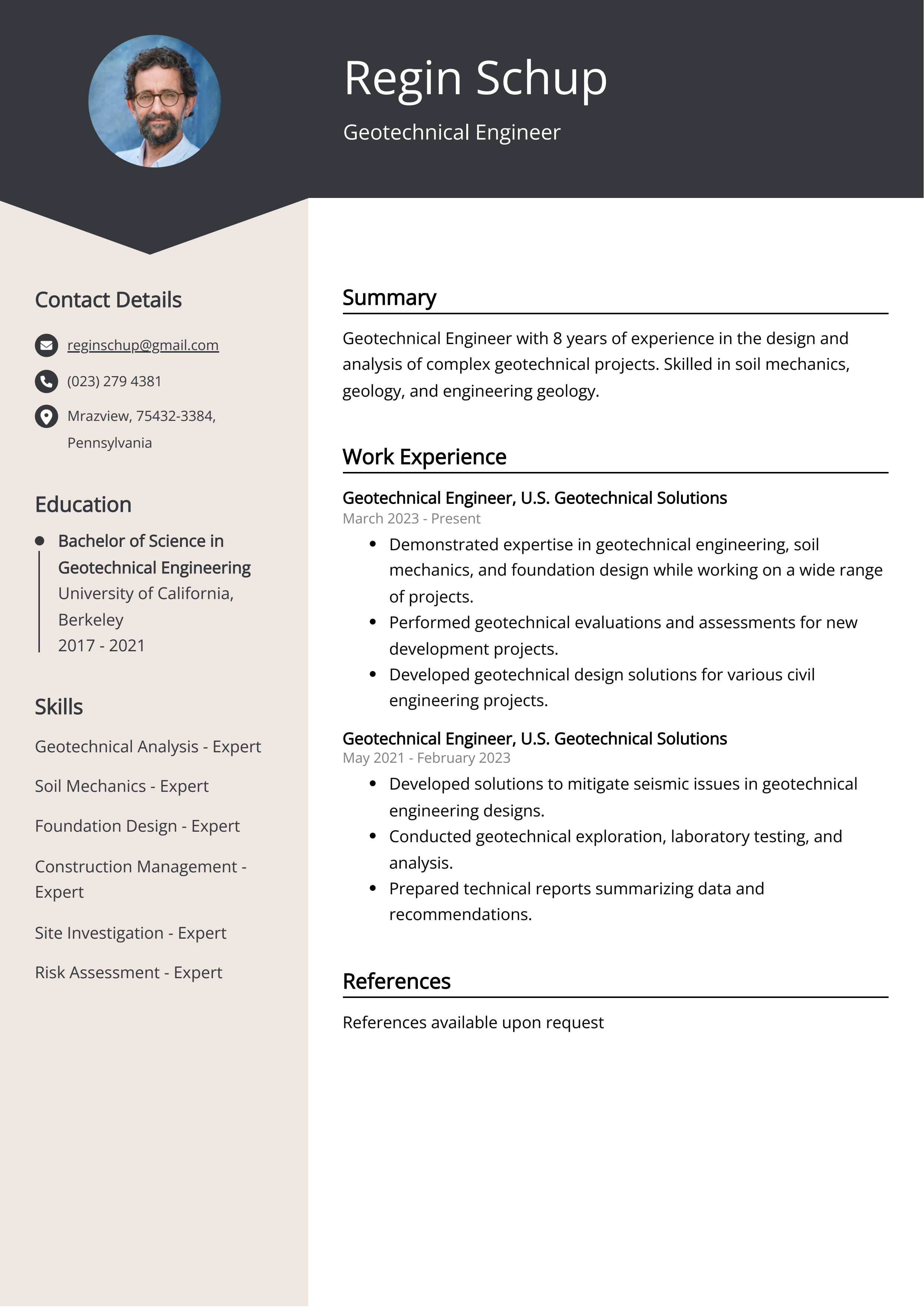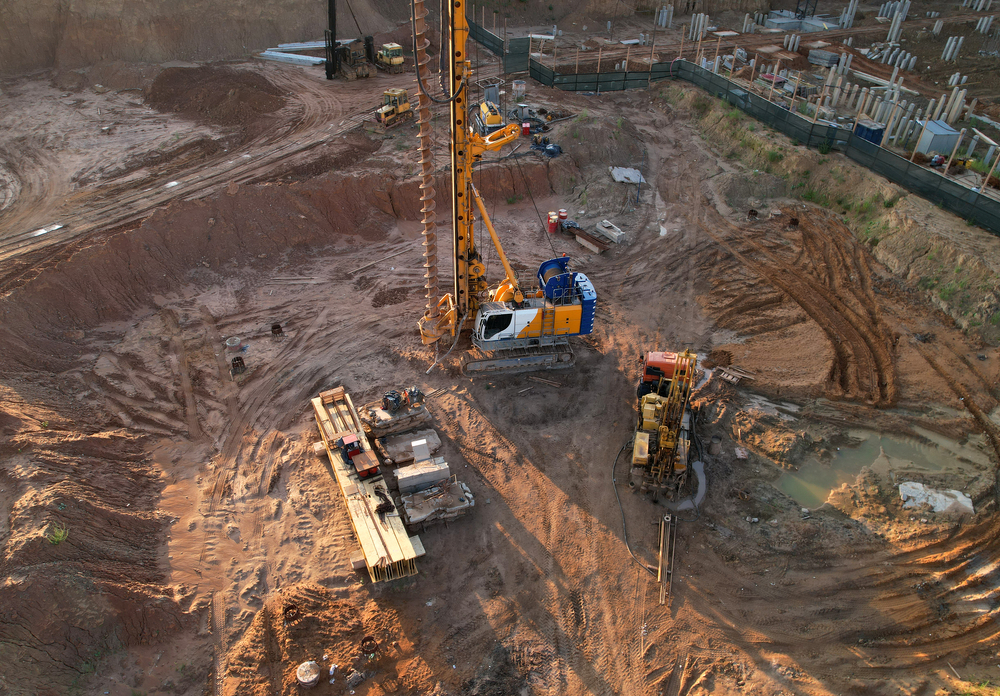Indicators on Geotheta You Should Know
Indicators on Geotheta You Should Know
Blog Article
The Ultimate Guide To Geotheta
Table of ContentsAll about GeothetaAll about GeothetaSome Known Incorrect Statements About Geotheta Some Known Incorrect Statements About Geotheta The Best Strategy To Use For Geotheta

They perform site investigations, gather examples, perform research laboratory examinations, and examine data to assess the viability of the ground for construction projects - Consulting Engineer. Based upon their findings, geotechnical designers give suggestions for foundation style, slope security, keeping frameworks, and reduction of geotechnical dangers. They collaborate with various other professionals, such as architects, architectural engineers, and building and construction groups, to ensure that geotechnical considerations are integrated into the general task layout and implementation
By examining the habits and residential or commercial properties of dirt and rock, they can determine prospective geotechnical threats such as landslides, dirt negotiation, or incline instability. Their experience aids stop failures or accidents that might threaten lives and residential property. Below are some thorough duties and responsibilities of a geotechnical designer: Website Examination: Geotechnical designers conduct website examinations to collect information on subsurface problems.
They analyze the information to comprehend the properties and behavior of the soil and rock, including their stamina, permeability, compaction qualities, and groundwater conditions. Geotechnical Analysis and Layout: Geotechnical designers assess the information gathered during website investigations to examine the security and suitability of the site for construction tasks. They execute geotechnical estimations and modeling to review elements such as bearing capability, settlement, incline security, side planet pressures, and groundwater circulation.
Geotheta - The Facts
Foundation Layout: Geotechnical designers play an essential function in developing foundations that can securely sustain the desired framework. They evaluate the dirt conditions and lots needs to identify the appropriate foundation type, such as superficial structures (e.g., footings), deep foundations (e.g (http://peterjackson.mee.nu/where_i_work#c2299)., heaps), or specialized strategies like dirt improvement. They consider factors such as settlement restrictions, birthing ability, and soil-structure communication to establish ideal structure styles
They review construction strategies, display website activities, and conduct area examinations to confirm that the style recommendations are followed. If unpredicted geotechnical concerns arise, they analyze the situation and provide referrals for remediation or adjustments to the layout. Danger Evaluation and Mitigation: Geotechnical designers assess geotechnical hazards and threats associated with the task site, such as landslides, liquefaction, or dirt erosion.

Collaboration and Communication: Geotechnical designers work carefully with various other experts entailed in a task, such as designers, structural designers, and building groups. Reliable interaction and collaboration are necessary to incorporate geotechnical considerations right into the general task style and construction process. Geotechnical engineers give technical know-how, answer inquiries, and ensure that geotechnical demands are met.
Geotheta Fundamentals Explained
Here are some types of geotechnical engineers: Foundation Designer: Foundation engineers concentrate on designing and examining structures for frameworks. They analyze the dirt conditions, tons needs, and website qualities to figure out the most appropriate foundation kind and design, such as shallow foundations, deep structures, or specialized methods like heap foundations.
They evaluate the factors affecting incline stability, such as soil buildings, groundwater problems, and incline geometry, and create strategies to stop incline failings and minimize threats. Quake Designer: Quake engineers focus on examining and creating frameworks to withstand seismic pressures. They assess the seismic threat of a website, review soil liquefaction potential, and develop seismic style criteria to ensure the safety and resilience of structures throughout quakes.
They do field screening, gather samples, and assess the collected data to identify the dirt properties, geologic formations, and groundwater problems at a website. Geotechnical Instrumentation Engineer: Geotechnical instrumentation designers concentrate on tracking and measuring the actions of dirt, rock, and frameworks. They mount and preserve instrumentation systems that check aspects such as soil negotiation, groundwater levels, incline movements, and architectural displacements to assess performance and provide very early warnings of possible problems.
The 10-Minute Rule for Geotheta
They conduct examinations such as triaxial examinations, combination examinations, direct shear examinations, and permeability examinations to collect data for geotechnical analysis and design. Geosynthetics Engineer: Geosynthetics designers specialize in the style and application of geosynthetic materials, such as geotextiles, geogrids, and geomembranes. They utilize these products to enhance dirt security, reinforce slopes, offer drain remedies, and control erosion.
They tend to be investigative people, which implies they're intellectual, introspective, and analytical. They are curious, methodical, rational, analytical, and logical. Several of them are additionally social, meaning they're kind, generous, cooperative, client, caring, useful, understanding, sensible, and pleasant. Does this noise like you? Take our cost-free profession test to learn if geotechnical engineer is just one of your leading career suits.
In the workplace setting, geotechnical designers use specialized software devices to perform calculations, develop designs, and examine information. They prepare reports, evaluation task requirements, interact with clients and group members, and coordinate task tasks. The office setup supplies a conducive setting for research study, evaluation, and cooperation with other professionals involved in the project.
How Geotheta can Save You Time, Stress, and Money.
They often see project sites to perform site examinations, evaluate geotechnical problems, and gather information for evaluation. These check outs involve traveling to various places, often in remote or tough surfaces. Geotechnical designers may carry home out dirt sampling, conduct tests, and monitor construction tasks to make sure that the geotechnical facets of the task are being implemented appropriately.
Geotechnical engineers also function in specialized geotechnical research laboratories. Geotechnical laboratory engineers function extensively in these atmospheres, taking care of testing devices, running tools, and taping data.
Report this page